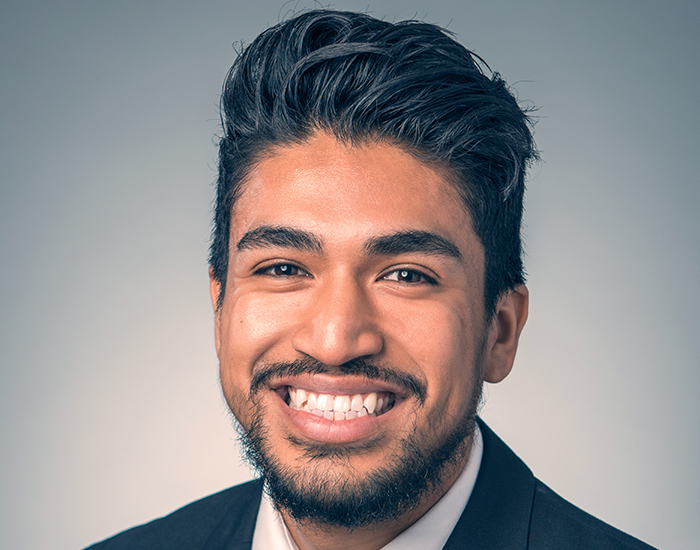After being accepted to multiple medical schools, Keck Graduate Institute alumnus Alejandro Quiñones, PPC ’20, has ultimately decided to attend the David Geffen School of Medicine at UCLA. His interest in pursuing a medical career was first sparked when he volunteered at his local hospital as a teenager. Still, the pivotal moment came while attending FastStart, a program designed for first-year UC Riverside (UCR) students from disadvantaged backgrounds pursuing medical careers.
In the program, he took a Health Disparities workshop. The instructors discussed different scenarios to illustrate what a health disparity was.
“They described a father who had to decide between going to a physician that morning to get medication for his diabetes or going to work to feed his family,” Quiñones said. “I remember thinking, ‘That sounds exactly like my father.'”
The instructors then shared more stories that paralleled Quiñones’ experiences growing up in Lynwood, a working-class, primarily Spanish-speaking community. He felt motivated to become a physician himself so that he could help bridge the gap between physicians and the communities they serve.
“I think it all comes down to being part of the community,” Quiñones said. “Although physicians are the holders of information, sometimes we forget that communities have much information to share. Since they don’t have the same resources as physicians, they have figured out how to overcome certain barriers independently.”
Since this experience, Quiñones has been actively involved with efforts to provide accessible quality healthcare to underserved communities in Southern California. While in KGI’s Postbaccalaureate Premedical Certificate (PPC) program, he served as Clinical Coordinator for the Pomona Free Clinic, where he helped facilitate the flow of volunteers providing blood pressure and diabetes screenings.
When volunteers expressed the desire to improve their Spanish to better communicate with patients, he became Co-Vice President of the clinic, teaming up with Roxanne Marquez Arellano, PharmD ’22, to provide medical Spanish.
Additionally, he volunteered at the Mt. San Antonio Gardens Independent Living Facility, where he collaborated with Assistant Professor of Clinical Sciences Amanda Tran to help residents navigate Zoom to communicate with their loved ones.
In the PPC program, he feels that the support he received—particularly from the program director and assistant director Joon Kim and Elba Muñoz—was instrumental in overcoming self-doubt and developing the confidence he needed to master the medical school applications process.
“Elba showed me how to become comfortable with my life experiences and encouraged me to be as genuine as possible when applying,” Quiñones said.
From Kim, he learned to analyze information from a systems-level perspective and view what initially seems like problems through a different lens, recognizing the big picture.
“Both of them instilled in me the importance of introspection,” Quiñones said.
“When applying to medical school, you need to reflect on who you are and your core values.”
After graduating from KGI, Quiñones continued his community outreach efforts, participating in the Health Careers Opportunity Program—sponsored by AltaMed, a Federally Qualified Health Center—to help pre-health students become stronger candidates for professional schools. He was also involved in PARTNER-Southeast Los Angeles Academy, which focuses on community-based participatory research.
One of their projects involved reaching out to community members concerning a new bill to expand MediCal.
“We talked with the community about their feelings regarding the bill being passed,” Quiñones said. “We also wanted to understand the barriers in place right now that could prevent them from applying and getting the services they need. This information can then be passed on to policymakers.”
Deciding which medical school to attend was challenging for Quiñones. Still, in the end, he chose UCLA mainly due to the school’s PRIME-LA program, which enables students to address policy, healthcare, and research issues in underserved communities.
“What better place to go than somewhere in my community that shares my mission?” Quiñones said. “Additionally, they awarded me the L.A. Care’s Elevating the Safety Net Scholarship with a stipend so that I can dedicate myself 100% to medicine.”
Over the years, Quiñones has volunteered with multiple free clinics. Going to a clinic—especially for the first time—can be stressful, so one of his roles was to help patients with stress management. To this end, the clinics offered everything from therapy to exercise classes in Zumba and Salsa.
“I learned a lot from the patients,” Quiñones said. “To me, ‘underserved’ means resiliency and solidarity.”
He recalls seeing a long line of patients outside the Pomona Free Clinic before the pandemic.
“This showed me how there’s so much need in the community for these services,” Quiñones said. “I realized there was so much more I could do to help. This moment also solidified my desire to become a physician.”
Though Quiñones is leaning toward a career in Primary Care, regardless of his chosen specialty, his primary goal is to continue giving back to the community.
“What I will always remember about Alejandro is the fascinating way he’s able to keep his amazing superpowers of empathy and excellence hidden under a cloak of humility,” Kim said. “Anyone meeting him won’t know how incredibly successful he is because that’s just the type of person he is—humble.”
Quiñones expresses gratitude to Kim, Muñoz, Tran, and all his mentors at KGI, as well as UCR, for helping him throughout his journey.
“It’s true when they say it takes a village,” Quiñones said. “For me, it took a whole city.”
